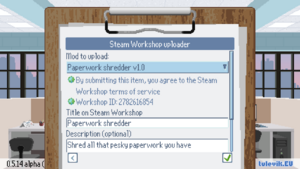Difference between revisions of "Creating mods"
(→Uploading your mod to Steam Workshop) |
|||
| (7 intermediate revisions by the same user not shown) | |||
| Line 1: | Line 1: | ||
== Getting started == | == Getting started == | ||
| − | Open the game folder and create folder named ''mods'' if it doesn't exist already. | + | Open the game folder and create a folder named ''mods'' if it doesn't exist already. |
Navigate inside the ''mods'' folder and create a new folder for your mod. The name should be alphanumeric and underscores should be used instead of spaces. | Navigate inside the ''mods'' folder and create a new folder for your mod. The name should be alphanumeric and underscores should be used instead of spaces. | ||
| Line 77: | Line 77: | ||
</pre> | </pre> | ||
| − | Now create the following folder structure in the root folder of your mod for your spritesheet: ''data\furniture\'' | + | [[File:mod_example_mod.png|thumb|Example furniture spritesheet]] |
| + | |||
| + | Now create the following folder structure in the root folder of your mod for your spritesheet: ''data\furniture\'' | ||
Inside that folder create a ''.png'' file with the same name as defined in the "spritesheet" field in ''furniture.json''. For example: ''mod_example_mod.png''. | Inside that folder create a ''.png'' file with the same name as defined in the "spritesheet" field in ''furniture.json''. For example: ''mod_example_mod.png''. | ||
| Line 84: | Line 86: | ||
The size of the spritesheet image should be 512x256 pixels and each sprite size is 32x48 pixels. | The size of the spritesheet image should be 512x256 pixels and each sprite size is 32x48 pixels. | ||
| + | |||
| + | Full example of the Paperwork Shredder is available on [https://github.com/riho/om101_paperwork_shredder_mod GitHub]. | ||
| + | |||
| + | == Adding character sprites to your mod == | ||
| + | An example mod is available on [https://github.com/riho/om101_christmas_101_mod Github]. | ||
== Uploading your mod to Steam Workshop == | == Uploading your mod to Steam Workshop == | ||
| + | |||
| + | [[File:steam_workshop_uploader.png|thumb|Steam Workshop uploader]] | ||
Launch the game, select ''Settings'' and then ''Steam Workshop uploader''. | Launch the game, select ''Settings'' and then ''Steam Workshop uploader''. | ||
| Line 95: | Line 104: | ||
You may be redirected to the [http://steamcommunity.com/sharedfiles/workshoplegalagreement Steam Workshop terms of service page] in the process to accept the agreement. | You may be redirected to the [http://steamcommunity.com/sharedfiles/workshoplegalagreement Steam Workshop terms of service page] in the process to accept the agreement. | ||
| − | + | '''NB! The uploaded mod will be available to the public right away.''' | |
| − | |||
| − | |||
Latest revision as of 01:53, 24 March 2022
Contents
Getting started
Open the game folder and create a folder named mods if it doesn't exist already.
Navigate inside the mods folder and create a new folder for your mod. The name should be alphanumeric and underscores should be used instead of spaces.
Inside of the folder of your new mod create a text file named index.json. This file describes the metadata for your mod.
Example contents of index.json:
{
"name": "Example mod name",
"description": "This is my example mod",
"version": "1.0",
"date": "2022-03-19",
"author": "tulevik.EU",
"game_name": "Office Management 101",
"game_version": "0.5.14_alpha",
"game_version_code": 1522,
"min_game_version_code": 1522,
"affects_savegames": false,
"requires_asset_reload": false
}
Modify the values of the fields accordingly.
Launch the game and select Settings in the main menu. If the game detects existence of mods the Mods menu will appear.
In the Mods menu your newly created mod should appear and can be enabled and disabled.
Adding furniture to your mod
At the moment our freshly created mod doesn't do anything.
To add a new furniture item so it can be used in the game we need to create a new folder in the root folder of your mod called presets.
In there create a file called furniture.json.
Example contents of furniture.json:
{
"categories": {
"modded": { name: "Modded furniture" }
},
"furniture": {
"example_item": {
"name": "Example item",
"downcase_name": "example item",
"description": "This is my modded example item",
"categories": [ "modded" ],
"price": 100,
"dimensions": [1, 1],
"spritesheet": "mod_example_mod",
"textures": {
"default": [1, 2, 3, 4]
},
"walkable": false,
"level": 1,
"quality": 5,
"can_break": false,
"placement": "normal",
"can_buy": true,
"can_move": true,
"can_trash": true,
"can_sell": true,
"prevent_on_wall": false,
"prevent_on_floor": false,
"prevent_furniture": true,
"allow_indoors": true,
"allow_outdoors": true,
"lighting": 0,
"block_lighting": 0
}
}
}
Now create the following folder structure in the root folder of your mod for your spritesheet: data\furniture\
Inside that folder create a .png file with the same name as defined in the "spritesheet" field in furniture.json. For example: mod_example_mod.png.
Note that the "spritesheet" field in furniture.json does not contain the file extension.
The size of the spritesheet image should be 512x256 pixels and each sprite size is 32x48 pixels.
Full example of the Paperwork Shredder is available on GitHub.
Adding character sprites to your mod
An example mod is available on Github.
Uploading your mod to Steam Workshop
Launch the game, select Settings and then Steam Workshop uploader.
From the Mod to upload dropdown menu select the mod you wish to upload. Set the title, description and cover image for your Workshop page and click the green checkbox button in the bottom right corner.
The image file you wish to use must be in the root folder of your game and in .png format.
You may be redirected to the Steam Workshop terms of service page in the process to accept the agreement.
NB! The uploaded mod will be available to the public right away.

